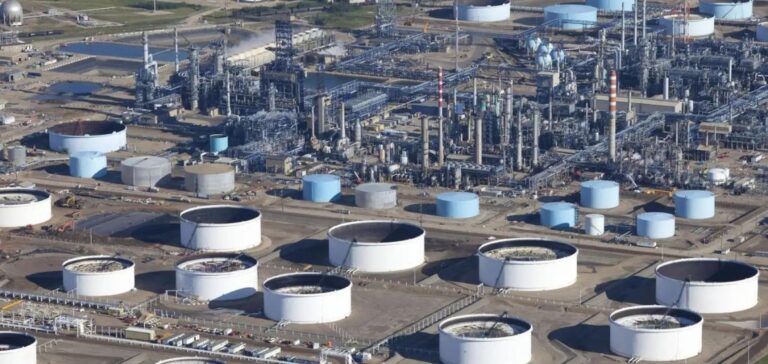U.S. commercial crude oil inventories dropped significantly, reaching a 12.2 million barrel decline for the week ending June 28, according to data released by the Energy Information Administration (EIA). This decline far exceeded analysts’ expectations, who had anticipated a reduction of just one million barrels, according to Bloomberg.
US refineries stepped up production, using 93.5% of their capacity, up from 92.2% the previous week. This ramp-up contributed to the decline in crude oil reserves. Meanwhile, crude oil exports rose by 12.5% in one week, reaching levels above official estimates, according to Kpler analyst Matt Smith.
Growth in exports and domestic demand
Exports of refined petroleum products also rose by 13.3%, propelling combined exports of crude and petroleum products to their highest level since mid-April. In the United States, implicit demand for refined products rose by 1.8% in one week, reaching a three-month high.
Demand for gasoline was particularly strong, jumping 5%, a level not seen for eight months. Gasoline inventories fell by 2.2 million barrels, whereas analysts were forecasting a reduction of just one million barrels. American consumers have been gearing up for the July 4th celebrations, leading to a surge in purchases of gasoline, kerosene and distillates.
Implications for the oil market
The EIA data provoked a momentary reaction on the oil markets, with the price of a barrel of West Texas Intermediate (WTI) for August delivery rising slightly to 82.94 dollars. However, this increase was short-lived, as prices quickly returned to their previous levels.
Fluctuations in US crude oil inventories and demand illustrate the complex dynamics of the global energy market. Inventory movements, influenced by variations in production and exports, have significant implications for oil prices and, by extension, for the world economy.
Analysis of recent developments highlights the importance of US refining infrastructure and export capacity in the global energy context. As domestic demand rises and exports continue to grow, crude oil inventories are likely to remain a key indicator for energy markets and investors alike.
Future prospects
Current trends suggest that the United States will continue to play a central role in the global energy market. The country’s ability to adapt its production and exports in response to fluctuations in global demand remains crucial. Demand prospects for refined products, particularly gasoline and distillates, will need to be closely monitored to anticipate future oil price trends.
The impact of seasonal events, such as the July 4th weekend, on oil demand also highlights the market’s sensitivity to temporary and local factors. Analysts will continue to closely monitor EIA publications and economic indicators to adjust their forecasts and investment strategies.





















